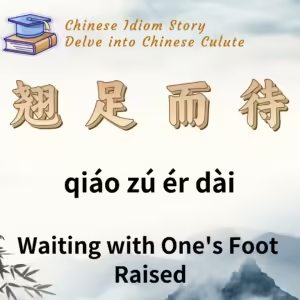
Chinese Idiom: 翘足而待 (Qiao Zu Er Dai)
English Translation: Waiting with One’s Foot Raised
pīn yīn: qiáo zú ér dài
Idiom Meaning: Originally, it refers to the brief time it takes to wait for something, suggesting that the wait is very short. It is often used to describe situations where disaster or downfall is imminent and can happen quickly.
Historical Source: The idiom is derived from Records of the Grand Historian (Shiji), specifically from the chapter Annals of Emperor Gaozu.
Idiom Story:
In 195 BC, Liu Bang (刘邦), the founding emperor of the Han Dynasty, was wounded by a stray arrow while suppressing the rebellion of King Qiang Bu of Huainan. After returning from the battlefield to Chang’an, his health worsened significantly. Empress Lü (吕后), Liu Bang’s wife, summoned skilled doctors to treat him. When Liu Bang inquired about his condition, the doctors hesitated to speak the truth and merely said, “Your illness can be treated.”
Knowing the severity of his situation, Liu Bang refused treatment and scolded the doctor, saying, “I rose from a commoner, wielding a three-foot sword to seize the throne. Isn’t this fate? Destiny is determined by heaven, and even if Bian Que (扁鹊), a legendary physician, were here, what could he do?” He then rewarded the doctor with fifty pounds of gold and sent him away.
Empress Lü, realizing Liu Bang’s condition was grave, asked him, “After your death, when Prime Minister Xiao dies, who will succeed him?” Liu Bang replied, “Cao Can can.” When she inquired who could succeed Cao Can, Liu Bang continued, “Wang Ling can, though he is a bit rough and straightforward; Chen Ping is exceptionally talented but cannot stand alone. They can assist each other. Zhou Bo is steady and sincere but lacks literary talent. However, it is Zhou Bo who will stabilize the Liu family’s reign, so he should be made the Grand Commander.” When Empress Lü asked about future successors, Liu Bang cryptically stated, “You won’t know what comes after.”
On the twenty-fifth day of the fourth lunar month that year, Liu Bang passed away at Chang Le Palace (located in present-day northwest Xi’an) at the age of sixty-two. Empress Lü delayed the announcement of his death for four days. Concerned about the discontent among the generals—many of whom shared Liu Bang’s humble origins—she and the strategist Shen Shiqi plotted to eliminate the generals, fearing they might refuse to obey the young emperor.
During this time, General Li Shang (郦商) learned of the emperor’s death and rushed to see Shen Shiqi. He warned, “I have heard the emperor has passed, and since four days have passed without mourning, there are plans to execute all the generals. If this is true, the realm will be in peril. Chen Ping and Guan Ying command a hundred thousand troops guarding Xingyang, while Fan Kuai and Zhou Bo command two hundred thousand troops in Yan and Dai. Once the generals hear of the emperor’s death and their execution, they will unite and attack the capital. The internal betrayal by officials and external rebellion by vassals will lead to ruin at any moment.”
Shen Shiqi immediately conveyed Li Shang’s message to Empress Lü, and on the twenty-eighth day, mourning was finally announced, followed by a general amnesty.
Thus, the phrase “翘足而待” evolved to signify an imminent disaster that could occur at any moment.






